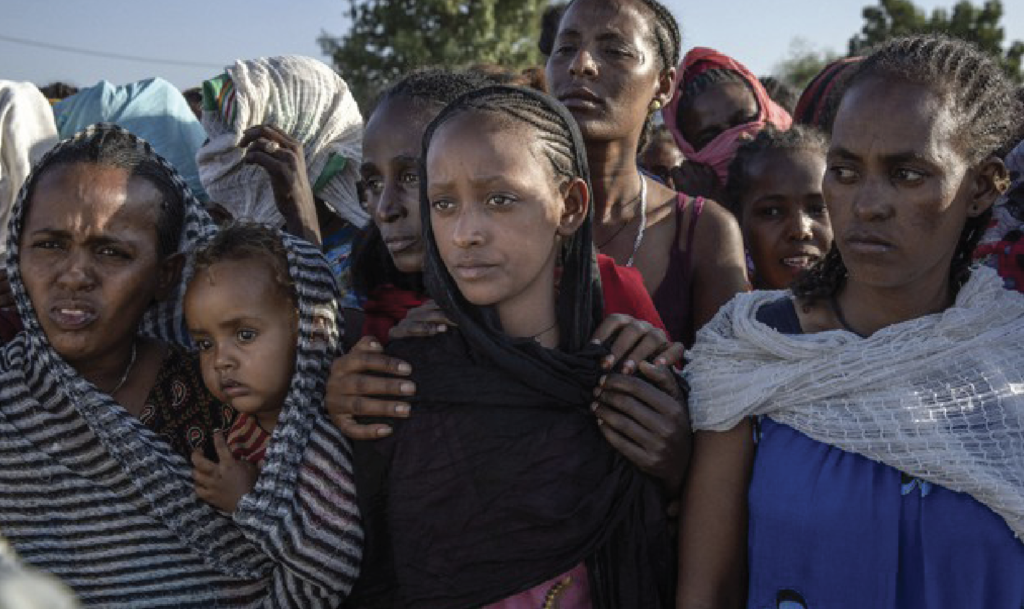
Mona Lisa, a recent high school graduate from Tigray, Ethiopia, lays motionless in a hospital bed. Her right arm has been amputated as a result of a gunshot wound inflicted by an Ethiopian soldier after she struggled to fend off his attempts to rape her.
On November 4, 2020, Ethiopian Prime Minister Abiy Ahmed declared war on Ethiopia’s Tigray region after the Tigray People’s Liberation Front (TPLF) — the party that currently governs the region — attacked a federal military facility.
Tensions between Abiy’s government and the TPLF had been brewing In 2018, prior to Abiy’s rise to power, Ethiopia’s government was ruled by the Ethiopian People’s Revolutionary Democratic Front (EPRDF). The EPRDF was a coalition of four political wings, each representing an ethnic group or nationality in Ethiopia – the Amhara Democratic Party, which represented the Amhara ethnic group, the Oromo Democratic Party, which represented the Oromo ethnic group, the Southern Ethiopian People’s Democratic Movement, which represented multiple ethnic groups, and the TPLF, representing the Tigrayans.
Even though Tigrayans make up only 6% of Ethiopia’s population, the TPLF dominated the most important positions in politics and the military. As a result, in 2018, other members of the EPRDF united against the TPLF to elect Abiy, the first Oromo in this position, as Prime Minister.
After Abiy’s victory, the Ethiopian government saw an opportunity to launch a “law enforcement operation,” which was their justification for a full-scale invasion. This invasion has brought up a major humanitarian crisis of sexual and gender-based violence, largely by the ENDF. Now, over one million people have been displaced and there have been 150 mass killings since war broke out, causing the deaths of over 1,900 Tigrayans.
According to Madiha Raza, a senior officer with the International Rescue Committee, “Women are having to engage in sexually exploitative relationships to survive, for food, shelter, or a little bit of money. Rape is definitely being used as a weapon of war.” What makes this even more horrific is that the majority of reported cases of rapes have been committed by men in uniform, such as those in the Ethiopian National Defense Forces, Eritrean Defense Forces, and Amhara Special Forces.
The Ethiopian government and its allies are committing genocide: allegations of ethnic cleansing, gang rapes, and extrajudicial killings have continued to surface since November of last year. One woman testified that her rapist claimed he was “cleansing the bloodlines of Tigrayan women.”
Abiy has claimed that he will hold those who were perpetrators of rape and looting in wartime accountable in a court of law, but this would require the Ethiopian government to prosecute members of their own military. It would also be a long and extensive process due to the length of this crisis and the large number of rape and looting cases.
Because of the difficulty of this plan, there needs to be a broader, international program to enforce the prosecution of rapists from not only places like Ethiopia, but worldwide. By doing this we can ensure that victims’ voices are heard properly and brought to justice. There must be an overhead power that can force the Ethiopian government to seek legal justice on behalf of the Tigrayan women.
Additionally, the UN must take preemptive measures to protect women around the world. Local organizations in Tigray do work to support victims of such crimes, but efforts by a global organization would be far more effective.
An organization with this scope is the UN. An effective program by the UN should have two parts. First, funding must be distributed to improve healthcare systems for the victims of the atrocities in the region. More access to resources and doctors will mean that the women in Tigray will be able to receive the help they need.
Second, steps must be taken to educate the women in these areas on how to prevent and report rape. If people have access to these resources and take advantage of them, Tigray will become far safer and victims will know what to do if they’re ever in a bad situation.
Although the U.S. has a history of intervening in conflicts abroad, it has hardly supported Ethiopia. In March, Democratic Senator Chris Coons, of Delaware, met with Abiy to encourage him to make peace with the TPLF. Soon after, Abiy confirmed the presence of Eritrean troops and of violence. It is evident Abiy cares about his reputation as a global leader — especially with Western countries — and that U.S. and European allies may be able to use their relationship with Abiy to encourage peace.
Violence against women in Ethiopia is a widespread and egregious violation of human rights. Steps must be taken to mitigate the conflict and support the victims of these atrocious crimes.
To help at-risk children in Tigray, consider donating to Save the Children’s Ethiopia Tigray Conflict Children’s Relief Fund.




